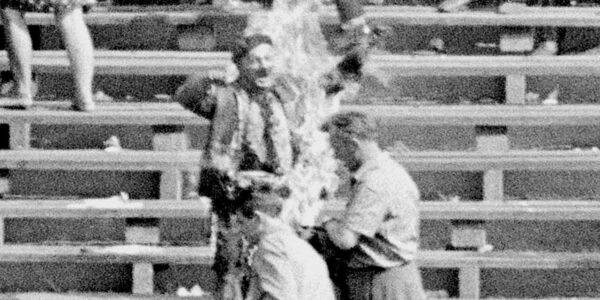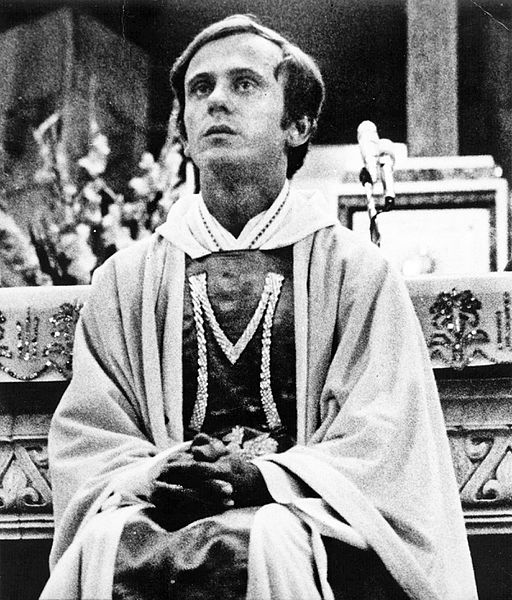By Beata Bruggeman-Sekowska
Grzegorz Przemyk (17 May 1964 – 14 May 1983) was an aspiring Polish poet whose untimely death became a powerful symbol of resistance against the Communist regime in Poland. His brutal killing at the hands of the Milicja Obywatelska (Citizens’ Militia) exposed the systemic violence and impunity of the communist authorities during the martial law period.
A Tragic End to a Celebration
On 12 May 1983, Grzegorz Przemyk had just celebrated his high school graduation when his life took a devastating turn. While joyfully marking the occasion with friends in Warsaw’s Castle Square, he was stopped by policemen and taken to a station under dubious pretenses. There, officers brutally beat him, focusing on his abdomen to avoid visible injuries. The supervising officer chillingly instructed: “Beat him in the stomach to leave no traces.”
The beating left Grzegorz collapsed in a corner, barely conscious. Desperate to rid themselves of responsibility, the officers called for an ambulance, claiming their victim was a drug addict or mentally unstable. The ambulance took him to a medical facility on Hoża Street, where a psychiatrist, not a surgeon, examined him. With no external signs of injury, the true extent of Grzegorz’s internal trauma went unnoticed.
Grzegorz’s mother, Barbara Sadowska—a known dissident—was informed by his friends and rushed to retrieve him. At home, Grzegorz writhed in pain, unable to eat or move. A doctor, called to examine him, dismissed his condition as minor, prescribing only painkillers. The medication did little to ease his suffering. By the next day, his condition worsened, prompting another ambulance ride to Solec Hospital.
The Fight for Survival Ends
At Solec, doctors were horrified by the extent of his injuries. One surgeon remarked, “It was as if a car had run over him.” Grzegorz suffered from a perforated intestine, extensive internal bleeding, and acute peritonitis. Despite an emergency operation, the damage was irreparable. On 14 May 1983, Grzegorz Przemyk succumbed to his injuries in the early afternoon. He was just 19 years old.
Death as Targeted Repression or Tragic Chance?
Grzegorz’s death was often interpreted as deliberate repression by the Communist regime. However, some argue that it was, in a sense, accidental. The case for intentionality stems from his mother, Barbara Sadowska’s activism. A member of the Primate’s Committee for Aid to Persons Deprived of Freedom and Their Families, Sadowska was a known target of the regime due to her work supporting thousands of detainees during martial law.
In early May 1983, pcommunist officers attacked the Committee’s offices, located in the parish of St. Martin. Employees were beaten, kidnapped, and abandoned outside the city; Sadowska herself was assaulted. Given the context, many suspected Grzegorz’s death was not random but an extension of the state’s campaign against his mother.
A Systematic Cover-Up
Within a month of Grzegorz’s death, the Ministry of Internal Affairs formed a special investigative group—not to uncover the truth but to bury it. General Czesław Kiszczak, head of the Ministry, oversaw the operation, with the Politburo closely monitoring the proceedings. The authorities quickly shifted blame to the ambulance crew that transported Grzegorz. A paramedic, who was trained in martial arts, was falsely accused of beating Grzegorz. A coerced witness even linked the crew to an unrelated assault to strengthen the fabricated case.
Grzegorz’s lawyer, Maciej Bednarkiewicz, was arrested for six months, and the ambulance driver faced threats to his family. Under duress, the driver falsely confessed to the crime. In July 1984, two policemen guilty of the beating were acquitted, while the ambulance crew faced wrongful convictions. It was only in 1989, after the fall of Communism, that the paramedics were exonerated.
Justice Delayed, Justice Denied
The struggle for justice did not end with the collapse of the regime. Sergeant Arkadiusz Denkiewicz, who ordered the “invisible” beating, was sentenced to two years in prison in 1997 but never served time due to alleged mental health issues. Another officer, Ireneusz Kościuk, was repeatedly acquitted, with courts unable to definitively prove his involvement. Only in 2006, when photographs from an early reenactment surfaced, was Kościuk identified as one of the assailants. Yet, the Supreme Court ruled in 2010 that the case was time-barred.
In 2012, the Institute of National Remembrance (IPN) launched an investigation into Communist officials, including Kiszczak, for obstructing and falsifying the case. While the crimes were confirmed, legal action was barred due to statutory limitations. Once again, perpetrators avoided accountability.
A Nation Mourns
Grzegorz’s funeral at Powązki Cemetery on 19 May turned into a massive protest against state violence. Tens of thousands of mourners silently marched in defiance of the Communist regime. Father Jerzy Popiełuszko, who officiated the ceremony, declared during a sermon: “The blood of Abel cries out for justice to God Himself!” These words resonated deeply, linking Grzegorz’s death to the broader struggle for freedom in Poland.
Legacy of Resistance
Grzegorz Przemyk’s death remains a harrowing reminder of the brutal repression under Poland’s Communist regime. His case exposed the government’s readiness to shield perpetrators of violence while punishing the innocent. Decades later, attempts to reopen the investigation faltered, with many crimes deemed time-barred.
Posthumously honored with the Knight’s Cross of the Order of Polonia Restituta, Grzegorz’s memory lives on as a symbol of defiance. His story, intertwined with Poland’s struggle for democracy, continues to inspire and demand justice for victims of state oppression.
Image: public domain, source IPN, https://commons.wikimedia.org/wiki/File:Grzegorz_Przemyk_IPN.jpg



Follow Us!